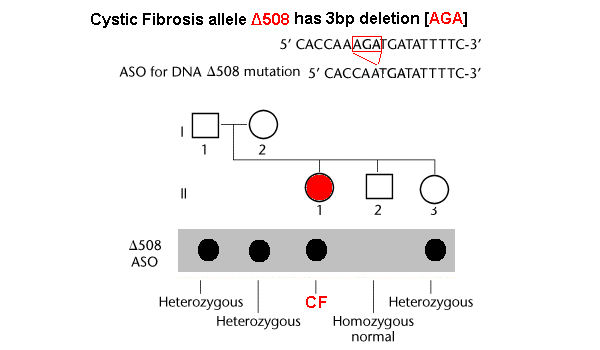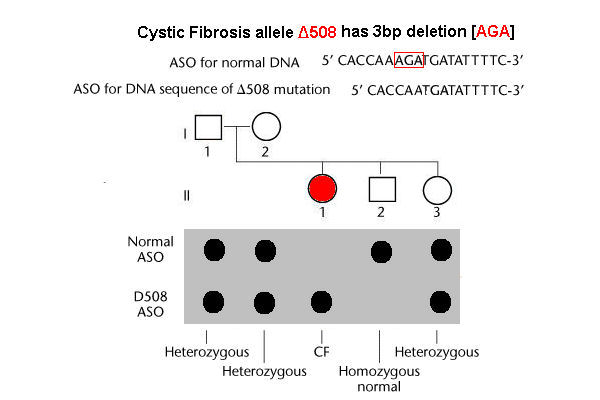
Allele-Specific Oligonucleotide (ASO) test for Cystic Fibrosis

Allele-Specific Oligonucleotide (ASO) test for Cystic Fibrosis
Cystic
Fibrosis (CF) is an autosomal recessive disease, characterized by accumulation of mucous in the lungs.
The most common allele that
leads to CF contains a 3bp
DNA deletion, and is called ![]() 508. In the pedigree, the birth of an
affected daughter (II-1) to two unaffected parents
indicates that both are heterozygotes. The question arises
whether the two unaffected siblings are carriers for CF.
508. In the pedigree, the birth of an
affected daughter (II-1) to two unaffected parents
indicates that both are heterozygotes. The question arises
whether the two unaffected siblings are carriers for CF.
An
oligonucleotide probe is constructed with a sequence
complementary to the exact DNA
sequence of the allele with the  508 deletion, that is, an allele-specific
oligonucleotide (ASO). DNA is obtained from all
family members and spotted onto a Southern hybridization
filter. The filter is probed with a radioactive ASO. Hybridization of
the ASO to the filter is
indicated by a spot on the autoradiogram,
which indicates the presence of the
508 deletion, that is, an allele-specific
oligonucleotide (ASO). DNA is obtained from all
family members and spotted onto a Southern hybridization
filter. The filter is probed with a radioactive ASO. Hybridization of
the ASO to the filter is
indicated by a spot on the autoradiogram,
which indicates the presence of the  508 allele. The molecular phenotypes of the
heterozygous parents and the affected daughter are as predicted:
each carries at least one
508 allele. The molecular phenotypes of the
heterozygous parents and the affected daughter are as predicted:
each carries at least one
 508 allele
and therefore tests positive. The unaffected son (II-2) tests "negative" for
the
508 allele
and therefore tests positive. The unaffected son (II-2) tests "negative" for
the  508 allele and is therefore "homozygous normal", whereas
his unaffected sister (II-3)
tests positive for
508 allele and is therefore "homozygous normal", whereas
his unaffected sister (II-3)
tests positive for  508, and is therefore a "carrier" for CF.
508, and is therefore a "carrier" for CF.
Because the ASO method avoids
electrophoresis and size determinations, such tests are rapid
and suitable for large-scale population screens. The test as
described has two weaknesses as a diagnostic tool. First, about 30% of CF cases in persons of European ancestry are
due to alternative alleles
other than  508, and will not be detected with this specific
test. Second, the
hybridization test is subject to "false negatives": perhaps II-2 is a carrier,
but the ASO hybridization
failed for technical reasons. The test can then be improved by
adding a parallel ASO "control"
test for the "standard" allele:
508, and will not be detected with this specific
test. Second, the
hybridization test is subject to "false negatives": perhaps II-2 is a carrier,
but the ASO hybridization
failed for technical reasons. The test can then be improved by
adding a parallel ASO "control"
test for the "standard" allele:
